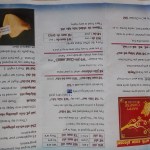

The sunny panda-face which China liked to show the world is beginning to lose its smile as economic and political realities catch up on the once so-positive super-nation.
In the early 2000s it began to launch exchange programs with universities around the world in order to learn from the best in other countries and extend friendly economic and cultural ties. At first it was thinking only of links between its own top universities and those in the US, UK and Japan but in the spirit of giving weaker provinces a chance to prosper it allowed them to begin projects with lesser known universities in smaller countries, such as Ireland.
Gradually it discovered that many of those universities did not have the resources to produce the hoped-for outcome and last year it ended 234 such partnerships.
Among them were four projects with UCD and UCC. It is not that all such programs have ended – some Irish universities have recently signed new agreements. However the old days of plentiful money and lose regulation are coming to an end. They are replaced by a more business-like attitude, more calculating than the previous affability.
This cooling down is reflected also in other aspects of the new China such as its attitude toward religion where toleration had been increasing since the mid-1980s. Now old laws and regulations are being resurrected to strengthen control and ensure that, in a communist state, religion is tolerated only in as far as it serves the government.
In future we are likely to see less of the panda’s smile and feel more of its substantial size and considerable weight.

























